Our live coverage is movingpublished at 00:15 BST 1 April 2022
For technical reasons, we are moving our live coverage to a new webpage.
Please click here to join us for all the latest.
Russian leader Vladimir Putin threatens to stop gas supplies to "unfriendly" countries if they don't deal in the Russian currency
He's signed a decree stating buyers "must open rouble accounts in Russian banks" from Friday
Germany says it will study the details of the demand but that there can be "no political blackmail" over gas imports
Putin's demand for rouble payments is an attempt to boost the currency, which has been hit by sanctions from the West
US President Joe Biden has announced the release of an unprecedented one million barrels of oil from the country's strategic stockpiles
Ukraine's government is sending dozens of buses to Mariupol, in a fresh effort to evacuate people and deliver humanitarian aid
Russia has declared a one-day ceasefire in the heavily bombed port city, but there is scepticism if it will hold - up to 170,000 people remain trapped
The head of defence alliance Nato says Russian units are being redeployed to fight in the east
Edited by Jude Sheerin
For technical reasons, we are moving our live coverage to a new webpage.
Please click here to join us for all the latest.
An ex-CIA intelligence expert says that US and UK intelligence officials "seem to have a good understanding of the plans and intentions of the Kremlin".
Speaking to BBC World News' Laura Trevelyan, John Sipher said the two countries were probably playing to Vladimir Putin's paranoia and creating friction in his inner circle.
Both countries have claimed in recent days that Putin is increasingly isolated and receiving poor information from military advisers.
Allow X content?
This article contains content provided by X. We ask for your permission before anything is loaded, as they may be using cookies and other technologies. You may want to read X’s cookie policy, external and privacy policy, external before accepting. To view this content choose ‘accept and continue’.
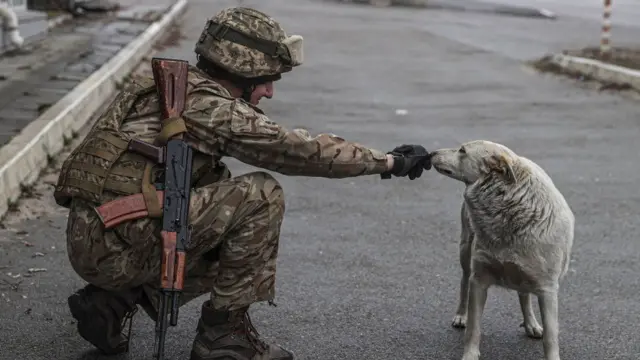 Image source, Getty Images
Image source, Getty ImagesLet's take a look at some of the major developments on Thursday:
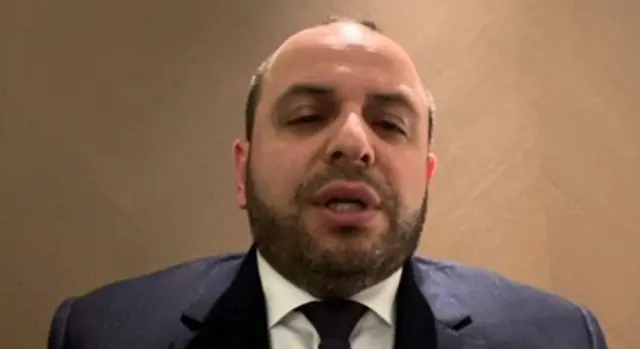
We've heard from Ukrainian MP Rustem Umerov, one of the negotiators who suffered symptoms of suspected poisoning at peace talks alongside Russian billionaire Roman Abramovich earlier this month.
One report after the incident said , externalthe alleged poisoning was orchestrated by Russian hardliners who wanted to sabotage the talks.
Speaking to the BBC, he said: "I feel better now, I feel good, but there was a situation.
"But my colleagues who are more competent in this sphere are analysing what it was and I hope during the shortest period of time they will be able to finalise it [their analysis] and I will be able to comment on it more thoroughly."
He said that while the talks were "very tense" at the start, "it takes courage to find solutions and to meet".
"We’ve had several rounds of negotiations and at the end of the day we’re coming to some sort of collective security agreement articles that we are trying to negotiate."
Umerov added: "We’ve been given a task to find a solution so I’m treating it as work and trying my best to find political and diplomatic resolution to this brutal invasion."
Ukraine's President Volodymyr Zelensky says the situation in the south and the Donbas region remain extremely difficult.
In a video address tonight, he reiterated that Russia was building up forces near the besieged city of Mariupol.
"There will be battles ahead. We still need to go down a very difficult path to get everything we want," he said.
Russia said earlier a humanitarian corridor would be opened tomorrow to allow civilians out of the south eastern port city of Mariupol.
The Pentagon said on Thursday it did not know if Russia's convoy of military vehicles converging on Kyiv, which once stretched some 40 miles, "still exists at this point".
"It's been now so long," said spokesman John Kirby. "They never really accomplished their mission."
The stalled convoy was never re-supplied, he noted, and was making little effort to advance on the capital even before Moscow announced its plans to reposition troops.
“We don't think that they properly planned for logistics and sustainment of a force that size in the field under combat conditions,” Kirby said.
“It's also a function of Ukrainian resistance and agility and frankly, just battlefield smarts,” he added.
A 3D model earlier this month showed the size of the Russian convoy
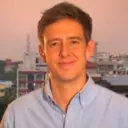 Nick Beake
Nick Beake
BBC News Europe correspondent, in Brussels
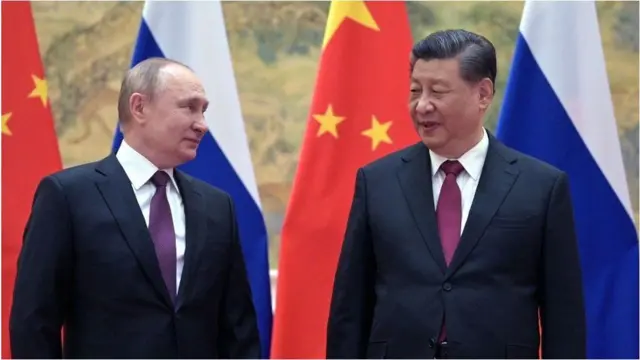 Image source, AFP
Image source, AFPThe EU is to urge China not to provide weapons to Russia in its war on Ukraine, nor give President Putin relief from Western sanctions.
China's President Xi Jinping – who has refused to condemn Moscow’s attack on its neighbour - will hold a three-hour virtual summit with officials on Friday, including President of the European Commission Ursula von der Leyen.
At the start of February, China and Russia issued a long, joint declaration saying theirs was a relationship with "no limits".
European leaders were worried by what they saw as a manifesto to redefine the international order.
A few weeks later, President Putin invaded Ukraine.
Western officials now believe Moscow has asked Beijing for military assistance and other help to cushion the blow of sanctions.
EU sources say von der Leyen will urge President Xi to reject such Russian requests and instead use China’s might to bring the fighting to an end – arguing the damage to the global economy benefits no one.
But China’s foreign minister has praised Russia this week for, in his words, preventing a large-scale humanitarian crisis and insisted the relationship with Moscow was heading in the right direction.
Brussels officials are not expecting any significant agreement from the virtual talks but hope China will consider dissuading Putin from using weapons of mass destruction as his war grinds on.
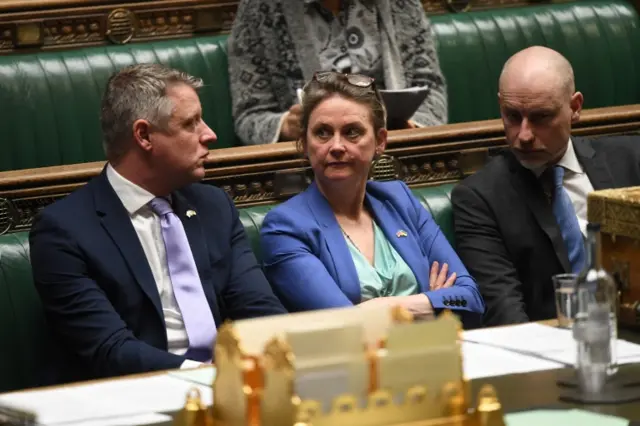 Image source, PA Media
Image source, PA MediaYvette Cooper said the situation people were facing was "Kafkaesque"
The UK has two visa schemes for Ukrainian refugees: The Ukraine Family Scheme, for people with a close relative living in the UK, and Homes for Ukraine, which allows people to sponsor named refugees, housing them in their homes or buildings.
But thousands of families are being "left in limbo" as a result of bureaucracy, Labour has warned.
Shadow home secretary Yvette Cooper told MPs earlier today that the schemes are not working, and went on to give a number of examples.
"A businesswoman who is trying to get her sister and daughter to come here on the family visa scheme is still waiting, 10 days since she applied to the Home Office.
"A constituent of mine in Pontefract who applied under the Homes for Ukraine scheme has been waiting nearly two weeks to hear anything back from the Home Office.
"Another British host who has applied for a visa for a woman undergoing a high-risk pregnancy [has been] waiting 12 days for a reply, despite the Home Office helpline saying she'd be treated as a priority."
On Wednesday, the UK said it had issued 2,700 visas through the Homes for Ukraine scheme and 22,800 under the Ukraine Family Scheme, which has been running for longer.

 Rajini Vaidyanathan
Rajini Vaidyanathan
BBC South Asia Correspondent, Delhi
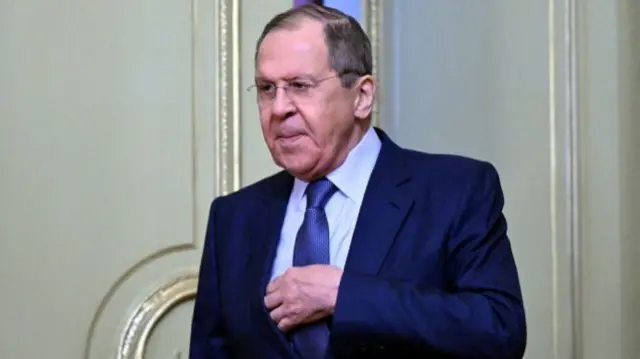 Image source, EPA
Image source, EPARussia’s Foreign Minister Sergei Lavrov has touched down in India, the latest official to visit in what feels like a conveyor belt of diplomacy.
In the last week or so, delegations from China, America, Germany, Japan and Mexico have also passed through.
Lavrov’s arrival came just as UK Foreign Secretary Liz Truss wrapped up a day of meetings in Delhi. While she’s unlikely to bump into Lavrov, the fact they’re both here at the same time is an indication of how India is being wooed from all sides.
New Delhi has remained neutral on the issue of Ukraine. Prime Minister Modi has called for the violence to end, but has stopped short of denouncing Russia’s actions.
Friday’s talks with Lavrov are expected to include discussions on how India can buy more cheap oil from Russia, using a payment system that would not breach sanctions regulations.
But the US deputy national security adviser Daleep Singh, who is yet another visitor in Delhi today, warned there would be “consequences to countries that actively attempt to circumvent or backfill the sanctions".
India is keen to stress that Russian oil makes up a tiny proportion of its overall purchases and that the EU still buys far more.
India's position remains one of neutrality. Here, Moscow remains a friend, not a foe.
As Thursday draws to an end in Ukraine, here are some pictures of people affected by the war on the 36th day of Russia's invasion.
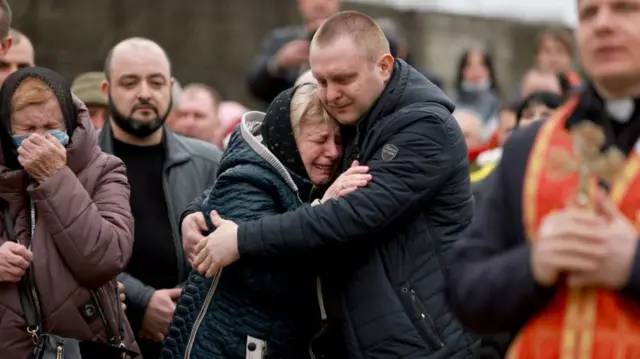 Image source, Getty Images
Image source, Getty ImagesRelatives of a Ukrainian soldier, Yuriy Oliynyk, attend his burial in the western city of Lviv
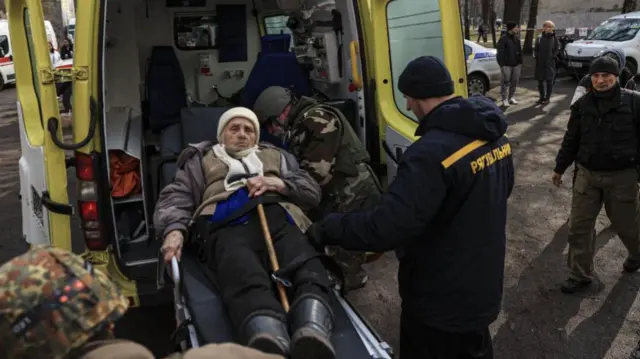 Image source, Getty Images
Image source, Getty ImagesThis man was among several people brought to a centre in Kyiv after being evacuated from the town of Irpin
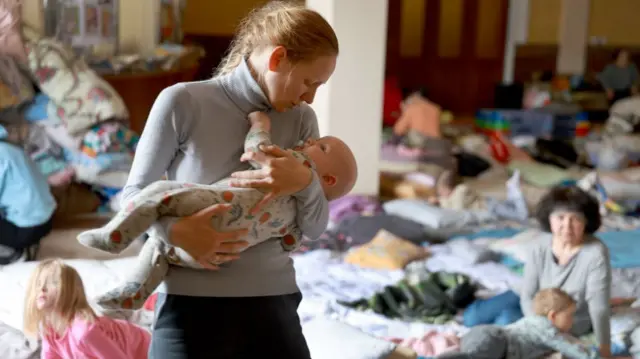 Image source, Getty Images
Image source, Getty ImagesXenia comforts her baby Alexander in a refugee centre in Lviv station, after fleeing her home in Kyiv
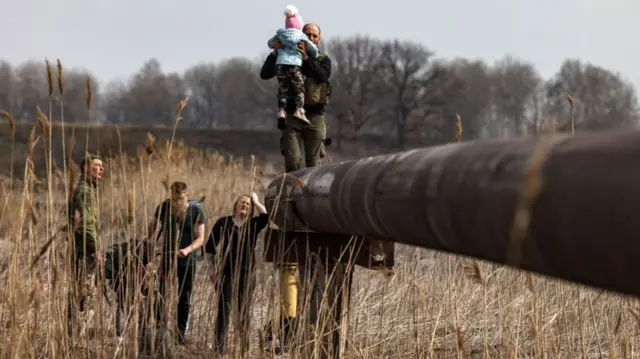 Image source, Getty Images
Image source, Getty ImagesA Ukrainian soldier carries a child from a displaced family across a river on the outskirts of Kyiv
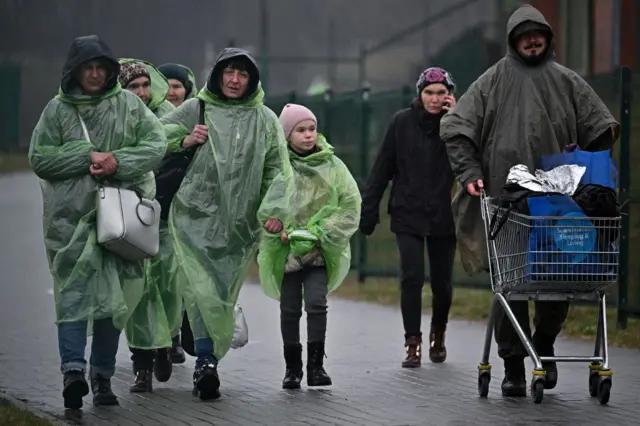 Image source, Getty Images
Image source, Getty ImagesRefugees are still arriving in Poland, although the UN says numbers have slowed in recent days
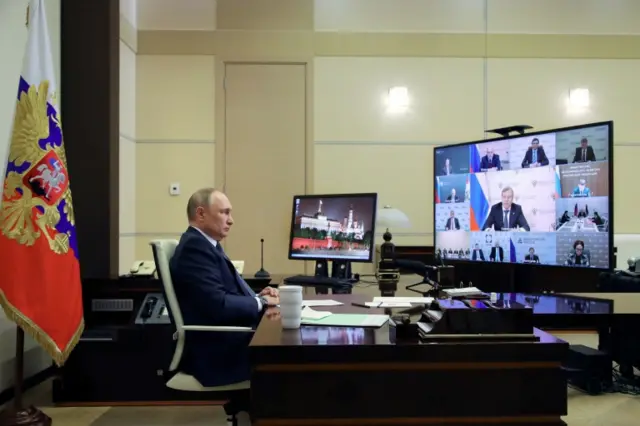 Image source, Reuters
Image source, ReutersRussia is now a "lesser country" as a result of its invasion of Ukraine, says UK Defence Secretary Ben Wallace.
Speaking to Sky News, he adds: "President Putin is not the force he used to be. He is now a man in a cage he built himself.
"His army is exhausted, he has suffered significant losses.
"The reputation of this great army of Russia has been trashed.
"He has not only got to live with the consequences of what he is doing to Ukraine, but he has also got to live with the consequences of what he has done to his own army."
Wallace says Russian forces appear to be regrouping and shifting their focus towards the south and east of Ukraine.
"We have seen it before. It always gets worse. It goes for more civilian attacks, more civilian areas."
He adds that international allies have agreed to supply more military equipment and "lethal aid" to Ukraine, including armoured vehicles and long-range artillery and ammunition.
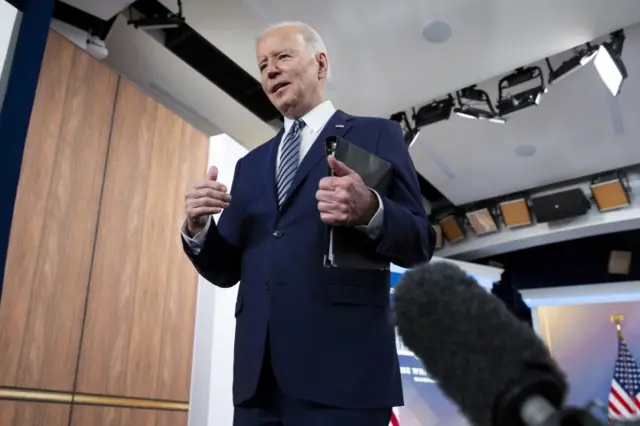 Image source, EPA
Image source, EPAThe US president has told journalists he is sceptical of Russian claims that it would pull troops away from Kyiv and focus on the east of the country.
"It's an open question whether he's actually pulling back," Joe Biden told journalists.
"Thus far, there is no clear evidence that he's pulling all his forces out of Kyiv. There is also evidence that he's beefing up his troops down in the Donbass area," he said.
"I don't know the answer, it appears so far... the idea that he's pulling all his troops out from around Kyiv and moving south - there's no evidence he's done that," he added
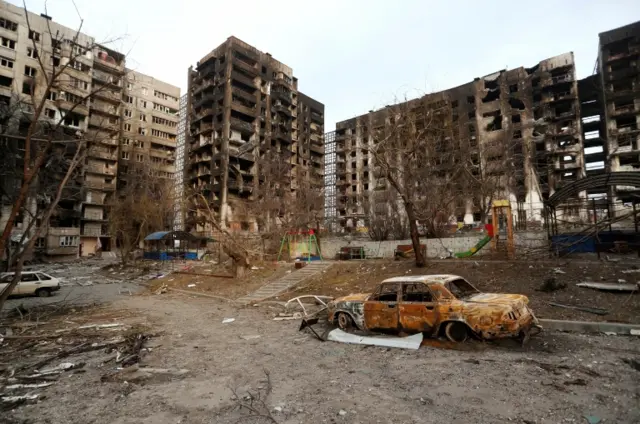 Image source, Reuters
Image source, ReutersIf you're just joining us, here is a recap of some of the main developments today:
On the international stage:
On the ground:
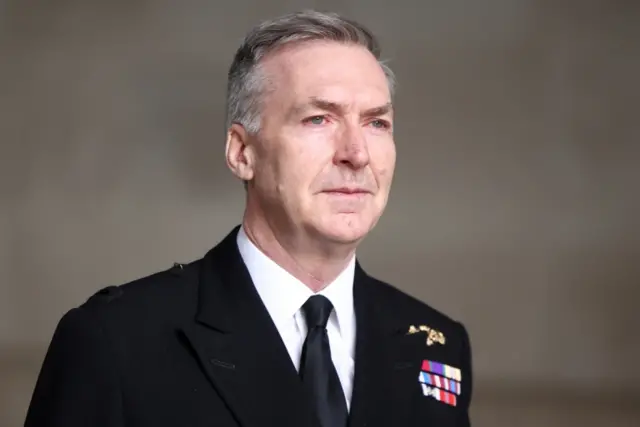 Image source, Reuters
Image source, ReutersAdmiral Sir Tony Radakin said Putin had damaged himself through a series of "catastrophic misjudgements"
Earlier this afternoon, the head of Britain's armed forces gave his update on the war.
In a speech followed by a question-and-answer session at the Institute for Government think tank, Admiral Sir Tony Radakin echoed sentiments made elsewhere by the UK and US, that Russian President Vladimir Putin had been "misled" about the effectiveness of his country's armed forces.
He said the UK was "incredibly cautious" about believing Russian claims of withdrawing from the capital Kyiv but said there did appear to be signs the Kremlin was preparing to focus its efforts on the east and south of Ukraine.
"We are starting to see the early indications of those forces being moved back from Kyiv and retreating to both Russia and Belarus," Radakin said.
"That in itself is a difficult evolution for Russia because they are doing that under contact, so Ukraine armed forces will attack those Russian forces as they retreat."
Radakin, who replaced General Sir Nick Carter in the top job late last year, warned the coming weeks would "continue to be very difficult" for Ukraine, before adding: "But in many ways, Putin has already lost.
"Far from being the far-sighted manipulator of events that he would have us believe, Putin has damaged himself through a series of catastrophic misjudgements."
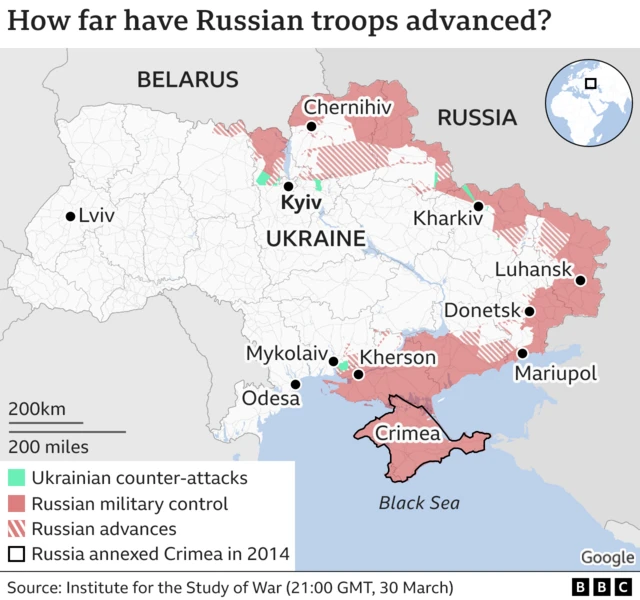
US President Joe Biden says Russian President Vladimir Putin "seems to be self-isolating".
"There's some indication that he has fired or put under house arrest some of his advisers," he claims.
"I don't want to put too much stock in that at this time because we don't have that much hard evidence."
More now from US President Joe Biden.
He says moving towards clean energy will help Americans deal with rising fuel prices.
The US must "double down on clean energy", Biden says, which includes passing his bill currently before Congress.
Biden says he's issuing a directive to strengthen the US's clean energy economy, using the Defense Production Act - which gives the government increased power over domestic industries in emergencies.
This will help secure American supply chains and reduce dependence on China and other countries for materials such as lithium, nickel and graphite, which are used in electric cars and energy storage, he says, in order to "build a made-in-America clean energy future".
This, he says, will save Americans money.
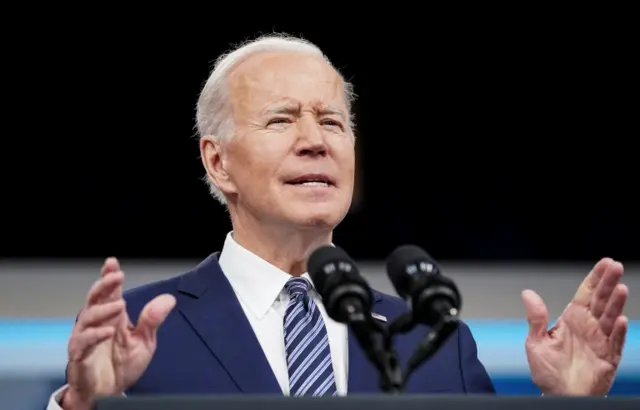 Image source, Reuters
Image source, ReutersPresident Biden said high oil prices were "hitting Americans at the pump"
US President Joe Biden is speaking about the way high oil prices are "hitting Americans at the pump".
"I know how much it hurts," he says.
He says banning Russian oil imports was "the right thing to do" but it would "come with a cost".
Biden says US oil companies are recording increasing profits and have a choice: Between putting these to use by producing more oil, giving US people a break, or "they can exploit the situation".
Biden says he is announcing a "use-it-or-lose it" policy, where companies will face fees for idle wells if they do not restart production.
President Joe Biden is now announcing plans to release a record amount of oil from US strategic stockpiles, in response to the Ukraine war.
We'll bring you updates from what he says.
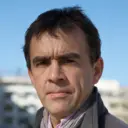 Wyre Davies
Wyre Davies
BBC News, Zaporizhzhia
Here in Zaporizhzhia, the last big city in Ukrainian held territory in the south east, local officials and aid workers are preparing to receive thousands of refugees from Mariupol.
Tens of thousands of people are trapped in the city after weeks of fighting and heavy Russian bombardments.
Organised by the Ukrainian government in conjunction with the Red Cross, the convoy of 45 buses, supported by medical vehicles, will depart from Zaporizhzhia on Friday but only if all sides can agree on a 24 hour ceasefire around the city.
Previous attempts to establish humanitarian corridors from Mariupol failed after vehicles were attack on the roads out.
A spokesperson for the ICRC said it was “desperately important the operation takes place - the lives of tens of thousands of people in Mariupol depend on it".
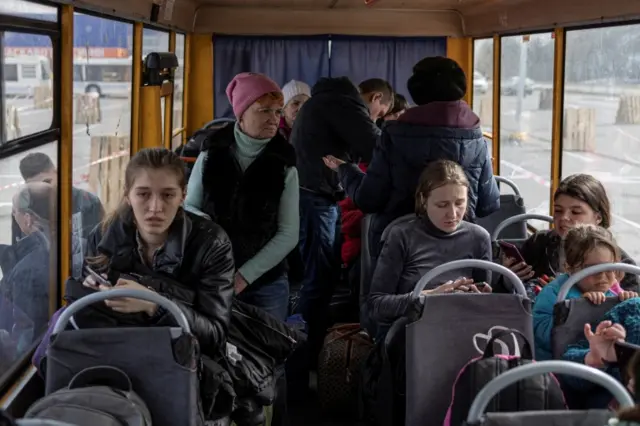 Image source, Reuters
Image source, Reuters
 Faisal Islam
Faisal Islam
BBC Economics Editor
For the Kremlin this is designed to suggest a dramatic escalation in the economic battle between the West and Russia over the invasion of Ukraine.
Vladimir Putin has outlined a pathway for the cutting off gas supplies to Europe, if Western customers refuse to pay for supplies in the Russian currency the rouble.
However, the market reaction suggests the details of the mechanism, means that, in practice, European customers will just have to change their currency dealers to Gazprombank. That bank has already been left unsanctioned, for the purpose of continuity of energy trade.
As a result, gas prices remain very high, but did not today shoot into the stratosphere. There should be a work-around. As one leading analyst told me, this solution has “saved face” for Putin, who can sound tough on domestic TV. Ultimately, as Russian officials have repeatedly said for decades, Russian supply of energy to the West continued uninterrupted even during the height of the Cold War.
Ultimately, Russia still needs the money for the gas and still wants to leave the possibility of a market for its main export, once a peace deal is signed. However, it is also true to say that the threat of a cut-off has escalated. EU nations have prepared emergency measures to manage demand, and would be more willing to face that now during spring and summer than winter.
The net effect of the mechanism announced is to limit the ability of the West to freeze the revenues they pay to Gazprom, which Putin described as receiving the gas for free.
Some Ukrainian officials have suggested such an approach. Oil and gas dollars and euros continue to help the Kremlin resist an otherwise tough set of financial sanctions.